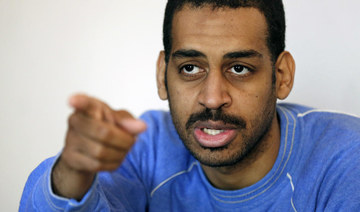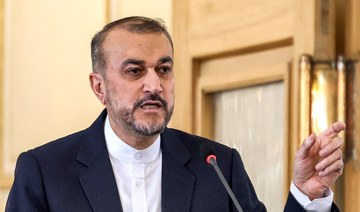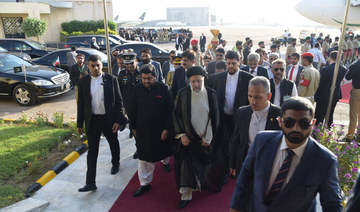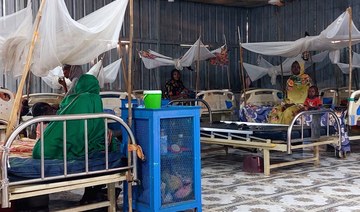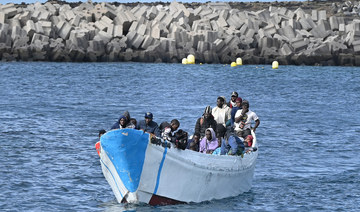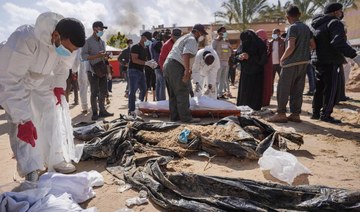ALEXANDRIA, United States: Alexanda Kotey, a member of the notorious Daesh kidnapping cell dubbed the “Beatles,” pleaded guilty Thursday in a US court to charges of conspiring to murder four American hostages.
The federal court in Alexandria, Virginia outside Washington had posted a notice this week for a “change of plea” hearing for Kotey, a former British national and one of two kidnap cell members brought to the United States for trial.
“Kotey has been afforded due process and in the face of overwhelming evidence, he made the independent decision to plead guilty to his crimes,” said Raj Parekh, Acting US Attorney for the Eastern District of Virginia, outside the courthouse.
“He has agreed to spend the rest of his life in prison.”
Kotey, 37, and El Shafee Elsheikh, 33, were flown from Iraq in October to face trial for involvement in the murders of American journalists James Foley and Steven Sotloff and relief workers Peter Kassig and Kayla Mueller.
After the two suspects were captured in January 2018 by Syrian Kurdish forces in Syria, they were turned over to US forces in Iraq.
Britain, which initially did not want to put them on trial at home, stripped them of their UK nationality.
But their transfer to the United States was made possible only after the US authorities assured London they would not seek the death penalty in the case.
Appearing from prison before Judge TS Ellis by video link on Oct 9, both pleaded not guilty.
But on Thursday, Kotey appeared in person and answered “yes” when Ellis asked him, “Are you pleading guilty freely and willingly and voluntarily because you’re in fact guilty of these charges?“
In pleading guilty, Kotey entered into an agreement to provide all information in his possession about his actions in Syria — not limited to what is in the indictment — to the US government, as well as to any foreign government that requests it.
Under the agreement, he will serve 15 years in jail in the United States and then will be extradited to the United Kingdom, where he also faces charges of kidnapping and murdering hostages.
By admitting his guilt, he waived his right to a trial and faces several life sentences without the right to early release.
The families of the four American victims were present in the courtroom. Prosecutor Dennis Fitzpatrick said they had agreed with the change in defense strategy.
James Foley’s mother, Diane, delivering remarks outside the courthouse, called on President Joe Biden, lawmakers and “all Americans to demand that our country protect and assist any innocent US national held hostage or wrongfully detained abroad.”
She extended the thanks of the families of the four American victims to the Justice Department and the prosecution team “that has brought such a strong case for (Kotey’s) direct culpability.”
Kotey and Elsheikh’s four-member Daesh cell was dubbed the “Beatles” by their captives due to their British accents.
They were allegedly involved in abducting American, European and Japanese hostages in Syria from 2012 to 2015.
They allegedly tortured and killed their victims, including by beheading, and IS released videos of the murders for propaganda purposes.
Alleged ringleader Mohamed Emwazi, known as “Jihadi John,” was killed in a US airstrike in Syria in November 2015, while the fourth “Beatle,” Aine Davis, is imprisoned in Turkey after being convicted on terrorism charges.
Kotey and Elsheikh supervised detention facilities for hostages and allegedly coordinated ransom negotiations conducted by email, according to the US authorities.
The pair also engaged in a “prolonged pattern of physical and psychological violence against hostages,” they said.
A US special forces raid that resulted in the death of Daesh group leader Abu Bakr Al-Baghdadi in Syria in 2019 was code-named Task Force 8-14, in reference to the birthday of the young aid worker Mueller.
She was working with the Danish Refugee Council when she was abducted in northern Syria in 2013.
Mueller’s parents say she was tortured before being handed over to Baghdadi, who allegedly raped her repeatedly before killing her.
“Years ago, Alexanda Kotey’s actions played out on the world stage, and those brutal crimes... are forever burned into the eyes of the American people,” said Assistant Director Steven M. D’Antuono of the FBI’s Washington Field Office, which investigated the case, cited in a Justice Department statement.
“This guilty plea will not lessen the suffering of those affected by his cruelty but I hope it reminds the world of the FBI’s unwavering dedication to finding and prosecuting all individuals who inflict harm on US citizens, no matter their location.”
Daesh ‘Beatle’ pleads guilty
https://arab.news/4uyys
Daesh ‘Beatle’ pleads guilty

- The federal court in Alexandria, Virginia outside Washington had posted a notice this week for a “change of plea” hearing for Kotey
- In pleading guilty, Kotey entered into an agreement to provide all information in his possession about his actions in Syria
Sudan military downs drones targeting its HQ in Shendi, say army sources
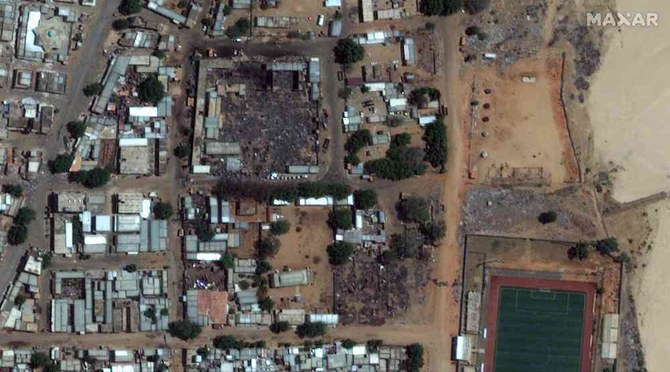
- None of the drones hit their target, the army sources said
- Sudan’s army is battling the paramilitary Rapid Support Forces for control of the vast north African country
CAIRO: Sudan’s army used anti-aircraft missiles on Tuesday to shoot down drones targeting its headquarters in the city of Shendi, witnesses and army sources said, the latest in a series of such drone attacks.
None of the drones hit their target, the army sources said. Reuters could not independently verify the report.
The head of Sudan’s army, General Abdel Fattah Al-Burhan, arrived on Monday in Shendi, which is some 180 km (112 miles) north of the capital Khartoum, army media reported earlier. It was not immediately clear whether he remains in the area.
Sudan’s army is battling the paramilitary Rapid Support Forces (RSF) for control of the vast north African country.
Tuesday’s drone attack is the third targeting areas that remain solidly under army control. The city of Atbara, also in River Nile state, and Al-Gedaref state to the east have also come under drone attack.
Both the army and the RSF have used drones in the conflict, which erupted a year ago.
The RSF, which controls much of Khartoum and western regions of the country, has not claimed responsibility for any of the attacks.
Shendi residents said the attacks have created panic in the town.
The war between the army and RSF has sparked warnings of famine, displaced millions, killed thousands in the crossfire and given way to ethnic killings by the RSF and allied militias.
The war appears likely to spread to the city of Al-Fashir, the army’s final holdout in the Darfur region, with many warning of a humanitarian catastrophe.
Iran threatens to annihilate Israel should it launch a major attack
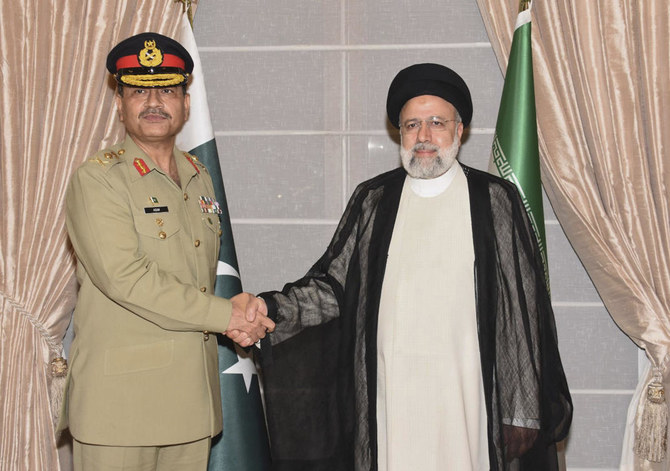
- Raisi began a three day visit to Pakistan on Monday
- "The Islamic Republic of Iran will honourably continue to support the Palestinian resistance," Raisi added
DUBAI: An Israeli attack on Iranian territory could radically change dynamics and result in there being nothing left of the "Zionist regime", Iran's President Ebrahim Raisi was quoted as saying on Tuesday by the official IRNA news agency.
Raisi began a three day visit to Pakistan on Monday and has vowed to boost trade between the neighbouring nations to $10 billion a year.
The two Muslim neighbours are seeking to mend ties after unprecedented tit-for-tat military strikes this year.
On Friday, explosions were heard over the Iranian city of Isfahan in what sources said was an Israeli attack, but Tehran played down the incident and said it had no plans for retaliation.
Iran launched a barrage of missiles and drones at Israel on April 13 in what it said was retaliation for Israel's suspected deadly strike on its embassy compound in Damascus on April 1, but almost all were shot down.
"The Islamic Republic of Iran will honourably continue to support the Palestinian resistance," Raisi added in the speech in Lahore.
Truce crumbles in Sudanese army’s last Darfur holdout
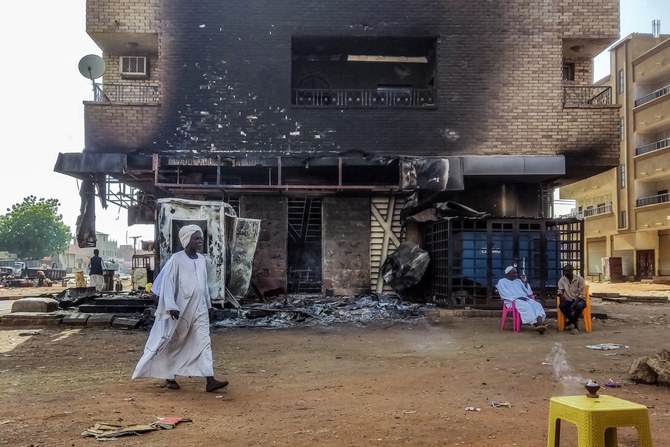
- Al-Fashir is the last major city in the vast, western Darfur region not under control of the paramilitary Rapid Support Forces (RSF)
- Witnesses say the army has reinforced supplies and troops, including through an air drop to its base in the city
CAIRO/DUBAI: Attacks around the Sudanese city of Al-Fashir have shattered a truce that protected it from a year-old war, leading to warnings of a new wave of inter-communal violence and humanitarian risks for 1.6 million residents crammed into the North Darfur capital.
Al-Fashir is the last major city in the vast, western Darfur region not under control of the paramilitary Rapid Support Forces (RSF). The RSF and its allies swept through four other Darfur state capitals last year, and were blamed for a campaign of ethnically driven killings against non-Arab groups and other abuses in West Darfur.
The fight for Al-Fashir, a historic center of power, could be more protracted, inflame ethnic tensions that surfaced in the early-2000s conflict in the region and reach across Sudan’s border with Chad, say residents, aid agencies and analysts.
Al-Fashir’s population includes an estimated half a million people displaced during that earlier conflict, when the army, assisted by Arab militias that evolved into the RSF, put down a rebellion by non-Arab rebel groups.
About half a million more people moved into the city during the war that broke out between the army and the RSF in the capital Khartoum in April 2023, as long-simmering tensions over integrating the two forces came to a head.
As the war spread to other parts of the country, local leaders brokered a truce in Al-Fashir, with the RSF confined to eastern areas of the city while the former rebel groups stayed neutral.
But the arrangement fell apart after the RSF took the town of Melit this month, effectively blockading Al-Fashir.
Witnesses say the army has reinforced supplies and troops, including through an air drop to its base in the city, unlike in other state capitals where soldiers quickly fled.
Two prominent former rebel groups, Minni Minawi’s Sudan Liberation Army (SLA) and Jibril Ibrahim’s Justice and Equality Movement, said they would also defend against the RSF.
Many non-Arabs in Al-Fashir are gripped with fear.
“We don’t know what to do,” 39-year-old resident Mohamed Gasim told Reuters by phone. “Al-Fashir is dangerous, but leaving is more dangerous.”
VILLAGES RAZED
Even before the truce collapsed, occasional skirmishes killed more than 220 people in Al-Fashir in the last year, according to Ismail Khareef, an activist in Abu Shouk, one of the displacement camps that dot the city.
Clashes on April 16 left at least 18 dead, Khareef said. Gunfire and projectiles, including from army warplanes, have fallen on homes, he and other residents say.
Since the start of the month, at least 11 villages on Al-Fashir’s outskirts have been razed, according to satellite imagery obtained by the Yale Humanitarian Research Lab. At least 36,000 have been displaced, the United Nations estimates.
Local activists and an SLA spokesperson blamed the RSF and allied militias, who have been known to use arson in past attacks, including in West Darfur. The activists said that survivors of the attacks reported around 10 people killed and that the attackers used ethnic insults.
The RSF denied attacking Al-Fashir and said it was careful to keep clashes away from civilians in the city, accusing the army and allied groups of attacking it on the outskirts. The RSF has previously denied responsibility for ethnic violence in Darfur.
The army did not immediately respond to requests for comment.
Al-Fashir itself has not had functioning running water or power lines for a year, said Awadalla Hamid, Darfur director for Practical Action, speaking to Reuters from the city, where few international humanitarians remain. Only one public hospital is functioning, while displaced people are crammed into schools and public buildings, he said.
Jerome Tubiana, an expert on Darfur and adviser to medical charity MSF, said all-out fighting “risks already complicating further humanitarian access, at a time where available data shows Al-Fashir is suffering of an extremely serious food crisis.”
SPILLOVER RISK
Since the war began, only small quantities of aid have entered Al-Fashir, the only army-approved conduit for shipments to other parts of Darfur. Residents say that though markets are functioning, the RSF’s control of the main road has caused prices for fuel, water and other goods to soar.
Recent tensions and violence around Al-Fashir have also raised concerns about a wider spillover.
The former rebel groups fighting alongside the army hail from the Zaghawa tribe, which reaches across the border into Chad, counting Chadian leader Mahamat Idriss Deby as a member.
Arab and non-Arab tribes like the Zaghawa have long clashed over land and valuable resources in Darfur, analysts say.
Complicating matters is the entrance of the forces belonging to Musa Hilal, a leading Arab commander from the early 2000s and rival of RSF commander Mohamed Hamdan Dagalo, known as Hemedti, despite hailing from the same tribe. A spokesperson confirmed a video of Hilal addressing forces in North Darfur on Monday, but said that it was too soon to say if the forces would join the fight in Al-Fashir or elsewhere.
“Even if there was a ceasefire between SAF and RSF this is way beyond them. There are scores being settled and tensions being renewed,” said Jonas Horner, an independent Sudan analyst.
Tunisian coast guard retrieves bodies of 19 migrants
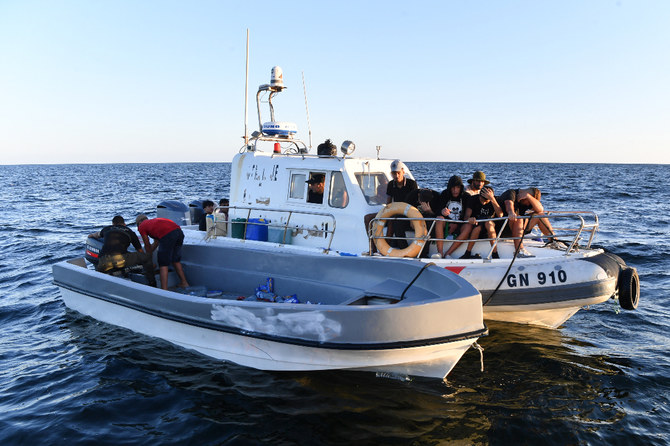
TUNIS, April 23 : The Tunisian coast guard has retrieved the bodies of 19 migrants who were trying to reach the Italian island of Lampedusa, the national guard said on Tuesday.
The latest incident took the number of migrant deaths off the Tunisian coast to nearly 200 in first four months of this year.
Israeli military rejects allegations of burying Palestinians in mass graves at Gaza hospital
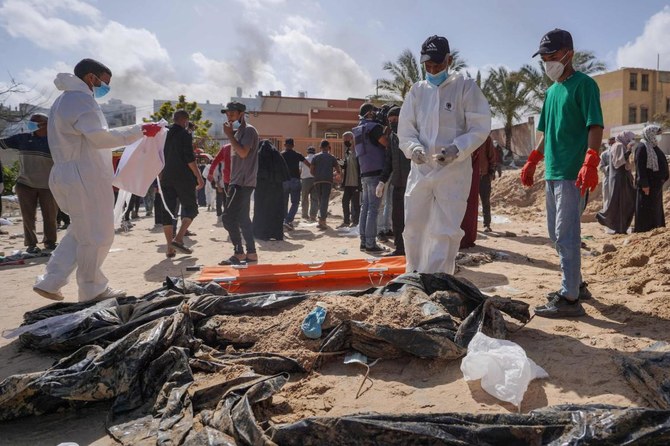
- The military said corpses already buried at Nasser hospital were examined as part of search for hostages
- UN calls for international probe into deaths at Gaza hospitals
GENEVA: Israeli military on Tuesday rejected allegations that its forces buried Palestinians in mass graves at a Gaza hospital, after the United Nations called for international investigation into the deaths during Israeli sieges, saying war crimes may have been committed.
In a statement, the military said corpses already buried at Nasser hospital were examined as part of search for hostages.
The UN rights office said it was “horrified” by the destruction of Gaza’s biggest hospital, Al-Shifa in Gaza City, and its second largest, the Nasser Medical Complex in Khan Yunis.
It called for an international investigation into reports of mass graves at the two Gaza hospitals destroyed in Israeli sieges.
On Monday, the Palestinian territory’s Civil Defense agency said health workers had uncovered more than 200 bodies of people killed and buried at Nasser hospital, which was besieged by Israeli troops last month.
In early April the World Health Organization said Al-Shifa had been destroyed by an Israeli siege, leaving an “empty shell” containing many bodies.
The UN rights office on Tuesday demanded “independent, effective and transparent investigations into the deaths.”
“Given the prevailing climate of impunity, this should include international investigators,” UN rights chief Volker Turk said in a statement.
Hospitals, which are protected under international law, have repeatedly come under Israeli bombardment over more than six months of war in Gaza.
Israel has accused Palestinian militant group Hamas of using Gazan medical facilities as command centers and to hold hostages abducted during its attack inside Israel on October 7.
Hamas has denied those claims.
International law violations
“Hospitals are entitled to very special protection under international humanitarian law,” Turk pointed out.
“And the intentional killing of civilians, detainees and others who are hors de combat is a war crime.”
The UN rights office said it did not have access to independent information as to what had transpired at the two hospitals.
But spokeswoman Ravina Shamdasani said efforts were under way to corroborate reports and details given by Gaza authorities.
The latter say 283 bodies were recovered from Nasser hospital, including 42 that had been identified.
“Victims had reportedly been buried deep in the ground and covered with waste,” she told reporters in Geneva.
Older people, women and wounded were reportedly among the dead, she said.
Others were allegedly “found with their hands tied and stripped of their clothes.”
As for Al-Shifa, the Israeli army has said around 200 Palestinians were killed during its military operation at the hospital
Shamdasani pointed to reports indicating that this toll “may be an underestimate.”
Around 30 bodies were reported found buried in two graves in the courtyard of Al-Shifa hospital.
“And there are reports that the hands of some of these bodies were also tied,” Shamdasani said.
So far, she said, the UN “can’t corroborate the exact figures” of people killed at the two hospitals, underlining: “This is why we are stressing the need for international investigations.”
“Clearly there have been multiple bodies discovered,” she said.
The reports that some had their hands tied indicated “serious violations” of international law, she added.
“These need to be subjected to further investigation... They can’t just be more reports in this horrific war that just pass under the radar.”



